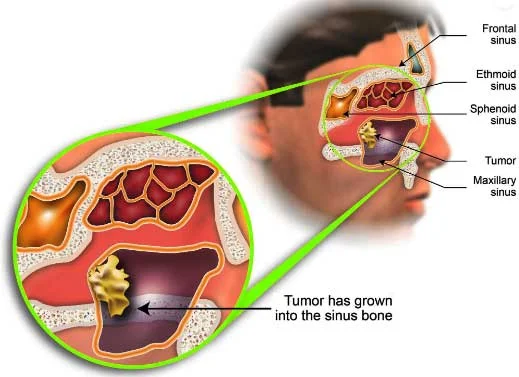
Sinus cancer is a rare type of cancer that affects the sinus cavities located in the skull bones around the nose. The sinus cavities are air-filled spaces that help to humidify and filter the air we breathe. Sinus Cancer Treatment & Surgery in Kukatpally is essential when the cells lining the sinus cavities grow uncontrollably and form a tumor, requiring timely medical attention. Symptoms of sinus cancer can include:
- Chronic congestion or stuffiness in the nose
- Nasal discharge or bleeding
- Facial pain or pressure
- Headaches
- Loss of smell or taste
- Vision problems or bulging of the eye
- Ear pain or pressure
- Loose teeth or dentures
How it is performed
Sinus cancer surgery is a complex surgical procedure that may involve the removal of part or all of the affected sinus cavity, as well as any surrounding tissue or bone that may be involved. In general, sinus cancer surgery is performed under general anesthesia, and may involve one or more of the following techniques:
- Endoscopic sinus surgery: This technique involves the use of a thin, flexible tube with a camera on the end (endoscope) to visualize the inside of the sinuses. The surgeon then uses specialized instruments to remove any tumors or cancerous tissue from the sinuses.
- Craniofacial resection: This is a more extensive surgery that involves removing a portion of the skull and facial bones to access the sinuses. This technique is typically reserved for more advanced cases of sinus cancer.
- Minimally invasive surgery: This may involve the use of robotic or other advanced technologies to remove the cancerous tissue through small incisions in the face or skull.
Why is the surgery done
Sinus cancer surgery is typically done to remove cancerous cells or tumors in the sinus cavity. Sinus cancer is a rare type of cancer, but it can be aggressive and can spread to other parts of the body if not treated promptly Sinus cancer surgery may also be done to alleviate symptoms associated with the cancer, such as chronic congestion, headaches, facial pain, or vision problems. In some cases, sinus cancer surgery may be combined with radiation therapy and/or chemotherapy to further reduce the risk of recurrence.
What to expect post surgery
After sinus cancer surgery, patients can expect a recovery period of several weeks to months, depending on the extent of the surgery and the individual's overall health. Here are some general things to expect after sinus cancer surgery:
- Patients may experience swelling, bruising, or tenderness around the surgical site and pain medications would be prescribed to help manage the pain & discomfort
- Nasal congestion and drainage are common after sinus surgery, and patients may need to use saline sprays or irrigations to help keep the sinuses moist and clear.
- Patients may need to follow a soft or liquid diet for a few days after surgery, and may need to avoid strenuous activity or heavy lifting for several weeks.
- Patients will need to schedule follow-up appointments with their healthcare provider to monitor their recovery and to check for any signs of recurrence.
- Patients may need to work with a physical therapist or speech therapist to help regain strength, mobility, or function following surgery
Risks associated with the surgery
As with any surgery, there are risks associated with sinus cancer surgery. Here are some potential risks associated with sinus cancer surgery:
- There is a risk of bleeding during or after surgery
- Sinus surgery can increase the risk of infection
- Surgery can damage nearby structures, such as the eyes or brain, which can cause vision problems, headaches, or other neurological symptoms.
- Sinus surgery can damage the olfactory nerves, which can result in a loss or change of smell.
- Surgery may result in swelling or inflammation that can make it difficult to breathe through the nose.
- There is a small risk of complications such as allergic reaction or adverse reaction to the anesthesia medication.
Frequently Asked Questions
-
Why should I choose Amrita ENT for sinus cancer treatment?
Amrita ENT offers expert care, advanced technology, and personalized treatment for sinus cancer patients.
-
Does Amrita ENT have experienced specialists for sinus cancer treatment?
Yes, our ENT specialists have extensive experience in diagnosing and treating sinus cancer.
-
How does Amrita ENT ensure patient safety during treatment?
We follow strict protocols, use advanced technology, and provide expert care for patient safety.
-
What is sinus cancer and how does it develop?
Sinus cancer is a rare tumor in sinus cavities caused by genetic and environmental factors.
-
What are the early symptoms of sinus cancer?
Symptoms include nasal congestion, nosebleeds, facial pain, swelling, and persistent headaches.
-
How is sinus cancer diagnosed?
Diagnosis includes imaging scans, nasal endoscopy, and biopsy to confirm cancer presence..
-
What are the risk factors for sinus cancer?
Risk factors include smoking, chemical exposure, HPV infection, and chronic sinusitis.
-
How often should I get screened for sinus cancer?
High-risk individuals should have regular ENT checkups to detect potential issues early.
-
Is sinus cancer life-threatening?
If untreated, it can spread, but early detection improves survival rates significantly.
-
What treatment options are available for sinus cancer?
Treatment includes surgery, radiation therapy, chemotherapy, and targeted drug therapies.
-
Can sinus cancer be treated without surgery?
In some cases, radiation and chemotherapy are used as primary treatments.
-
Can sinus cancer spread to other parts of the body?
Yes, if untreated, it can spread to lymph nodes, bones, and the brain.
-
Are there any lifestyle changes to prevent sinus cancer?
Avoid smoking, reduce chemical exposure, and maintain nasal hygiene to lower risk.
-
Does sinus cancer cause difficulty in breathing?
Yes, tumor growth can obstruct nasal passages, leading to breathing issues.
-
What should I do if I suspect sinus cancer symptoms?
Consult an ENT specialist immediately for evaluation, diagnosis, and appropriate treatment planning.
